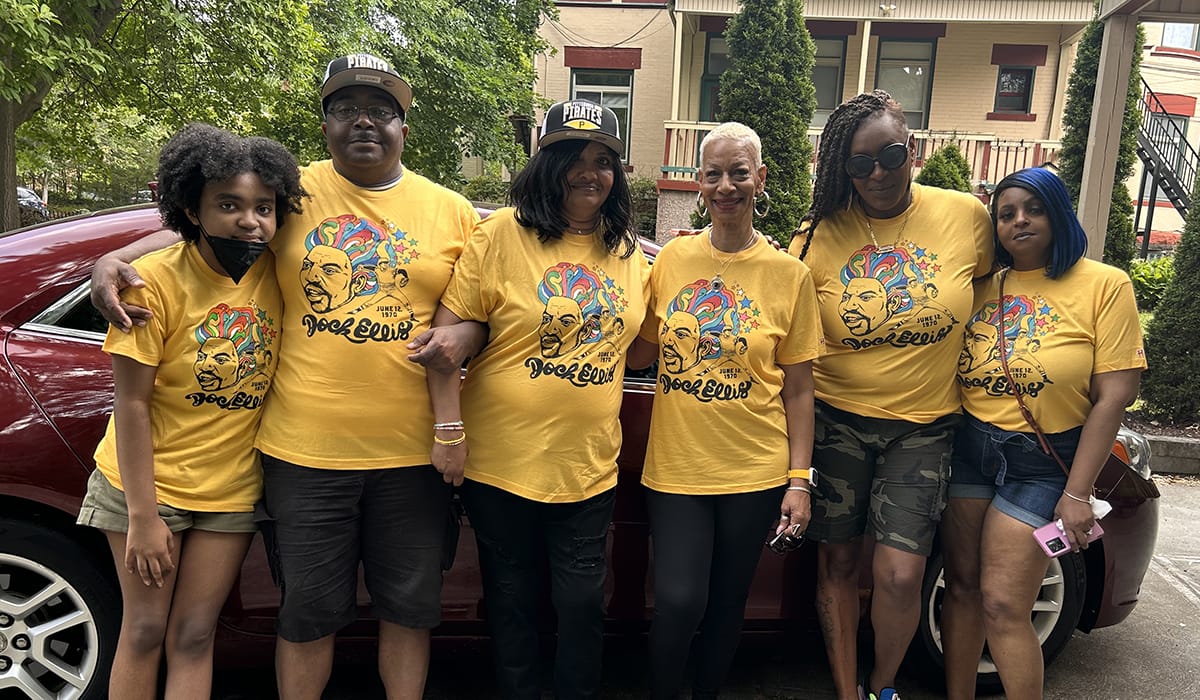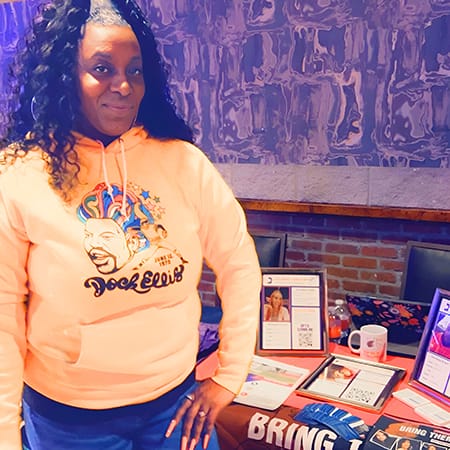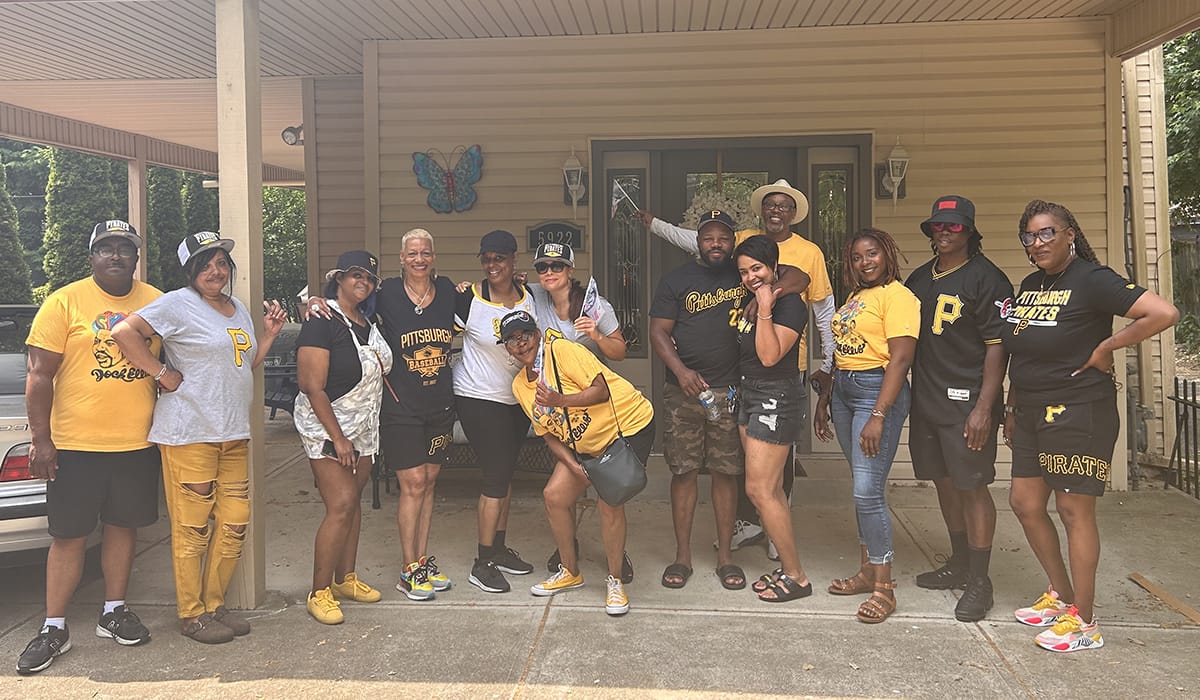Daughter of Legendary Baseball Player Continues Legacy of Caring for Those Often Overlooked

Meet Daily Point of Light Award honoree Jasmine Ellis. Read her story, and nominate an outstanding volunteer or family as a Daily Point of Light.
Content Warning: Points of Light is proud to share the following uplifting and inspiring story. However, we acknowledge that a small portion may be difficult for some readers. We encourage you to please care for your own wellbeing above all.
As the daughter of Dock Ellis, a professional baseball player known for pitching a no-hitter on LSD, Jasmine Ellis understands the journey through addiction and recovery. Dock eventually left baseball and got sober, dedicating his life to helping others.
“As a kid, I’d wake up in the morning, and sometimes we’d have inmates and their wives sitting at the dinner table. My dad would say, ‘Oh, he just got out last week and I told him your mom’s going to cook real good meal.’ We just grew up that way,” Jasmine recalls.
At college, she studied to be a counselor, following in her parents’ footsteps and worked in the victim services sector for more than 15 years, eventually becoming the director of a domestic violence shelter.
“I created a hotline here in Las Vegas to assist with handling the number of survivors who were needing to be placed in shelters,” Jasmine says.
Through that work, she identified a gap in services. When loved ones of missing persons would check with safehouses and shelters for someone, she was unable to confirm or deny their presence due to confidentiality rules. There was no one to serve families looking for someone or helping after they were found.
Jasmine created the Dock Ellis Foundation to honor her father’s legacy of caring for others and to increase the odds of missing persons being found alive and brought to safety. She focuses on cases involving minorities and people from underserved communities. These groups are often unaware of resources available and distrust the police.
“Our main goal was to build the relationship with law enforcement in these communities,” the CEO explains. “Oftentimes you realize that it’s all about communication.”
Acting as the go-between for officers and families, she explains what’s happening and why to the latter, who might feel that things aren’t progressing. Alternatively, she explains to officers how their words may be interpreted and that she’s available to assist.
With just two volunteers and active board members, one of whom has been searching for her sister for more than 21 years, there are eight people on her team. Just eight people, who also work full-time elsewhere, successfully brought home more than 300 missing people from across the country last year. They answered 3,450 hotline calls providing emergency support, safety plans and essential resources.

Once Jasmine connects with the family of a missing person, she starts building a relationship and connecting them with resources. She partners with search and rescue teams to advocate for the missing person and oversees media support, like a 2023 billboard awareness campaign in Ohio and Colorado. Sometimes, a case may involve determining if a missing person case involves addiction or showing police that someone who may initially be classified as a runaway actually qualifies for an Amber or Ebony Alert, an alert for missing Black females implemented in California. Other times, she coordinates fundraising efforts and navigates grant applications.
“When you see that somebody’s missing, take it seriously. You could be on social media, and you see a missing person flyer, or maybe you’re watching the news and you see a popup. Keep that person in the back of your mind. Shares are free. Tell a friend. Print out the flyer,” Jasmine suggests. “We need more people to start caring about the number of individuals who are missing.”
When everything goes right and a person is safely returned, there can be any number of different aftercare resources needed—clothing, medical care, housing, addiction services, basic check-ins and beyond. If a child has run away from home, mediation may be in order before returning. The foundation also offers two mentorship programs: one for young ladies and one for young men who might need help getting back on track. Jasmine uses personal funds for supplies to supplement external funding.
“No matter what street we start on—addiction, domestic violence, sex trafficking, gun violence—we all end up at the same intersection, because they all intertwine,” Jasmine states.
What many people don’t realize is that Jasmine herself is a survivor of both human trafficking and multiple accounts of domestic violence. It took her years of being in the field to understand that she was being groomed as a teenager.
“I was one of those kids that was labeled a runaway who was in a not-so-safe situation,” she recalls.
Jasmine laments the lack of widespread knowledge about resources and signs of abuse and trafficking. People can access services when they pick up a phone and make an escape plan, but they have to first recognize the danger they’re in. Last year, with National Missing and Exploited, the Dock Ellis Foundation provided training on sextortion and human trafficking to more than 50 youth in minority communities.
“Oftentimes, we don’t think that we’re victims, because we fight back or we yell back,” she says. “When I was trying to get help, I didn’t know anything about a shelter, or safe house or a crisis hotline, and I was an adult.”
Years later, when trying to escape her second abuser, Jasmine left her home in California for Las Vegas but was followed and attacked again. After an encounter with the police, her abuser went back to California. A year later, she got a call telling her he had been shot by another of his victims. Her first abuser had fallen to the same fate.
“I keep it in the back of my mind because I know how bad it can be,” Jasmine says. “Knowing that allows me to give everything I’ve got to help somebody get out of it.”
Jasmine continues to show strength both as a survivor and as a pillar for others to lean on. Andrea Williams, a North Carolina-based US Army veteran recently partnered with the foundation as a personal security consultant. Talking to Jasmine sealed the deal.
“It really made me want to be a part of what they’re doing,” she states. “She really tries to ensure that her team is being their best selves. She is an encourager. And she is someone who is very well-versed and very intentional.”
Andrea leads virtual trainings that cover self and situational awareness, safety measures, plans, etc. for anyone who wants to feel empowered. It’s one of many resources the Dock Ellis Foundation provides.
Today, Jasmine has stepped away from her job at the shelter to work from home and dedicate all of her attention to the organization. She finds joy with her fiancé, a person she met when they were just 13 years old, and a rescue dog she’s had for over a decade

“You have to really practice self-care. You have to turn it off, because you’re carrying a lot of weight from people that you don’t know,” she admits.
In the future, Jasmine hopes to open safe houses in multiple states in a type of Underground Railroad in which she could immediately place fleeing victims and begin services. Educating kids is also key to her strategy.
“We’ve got to start addressing the words, like adultification and toxic love, trends on TikTok. You have to peel back that layer. What do you think toxic love means?” she says.
In the meantime, getting a call from a parent who has been informed that their child has been found is its own reward. Using her life experiences, Jasmine helps in her community and beyond because she is uniquely positioned to empathize and advocate for people who aren’t able to do so for themselves.
“When you’re in the business that she’s in, it’s a sacrifice,” Andrea says. “It is very hard work.“
For families and loved ones of missing persons, that work is everything. And for those on the outside, it’s a sacrifice that strengthens the mind knowing that someone will have their back if they ever need it. That is Jasmine’s legacy.
Do you want to make a difference in your community like Jasmine? Find local volunteer opportunities.
If you or someone you know has experienced the trauma of human trafficking, contact the National Human Trafficking Hotline through chat or by phone at (888) 373.7888. This service is free, confidential and available 24/7.